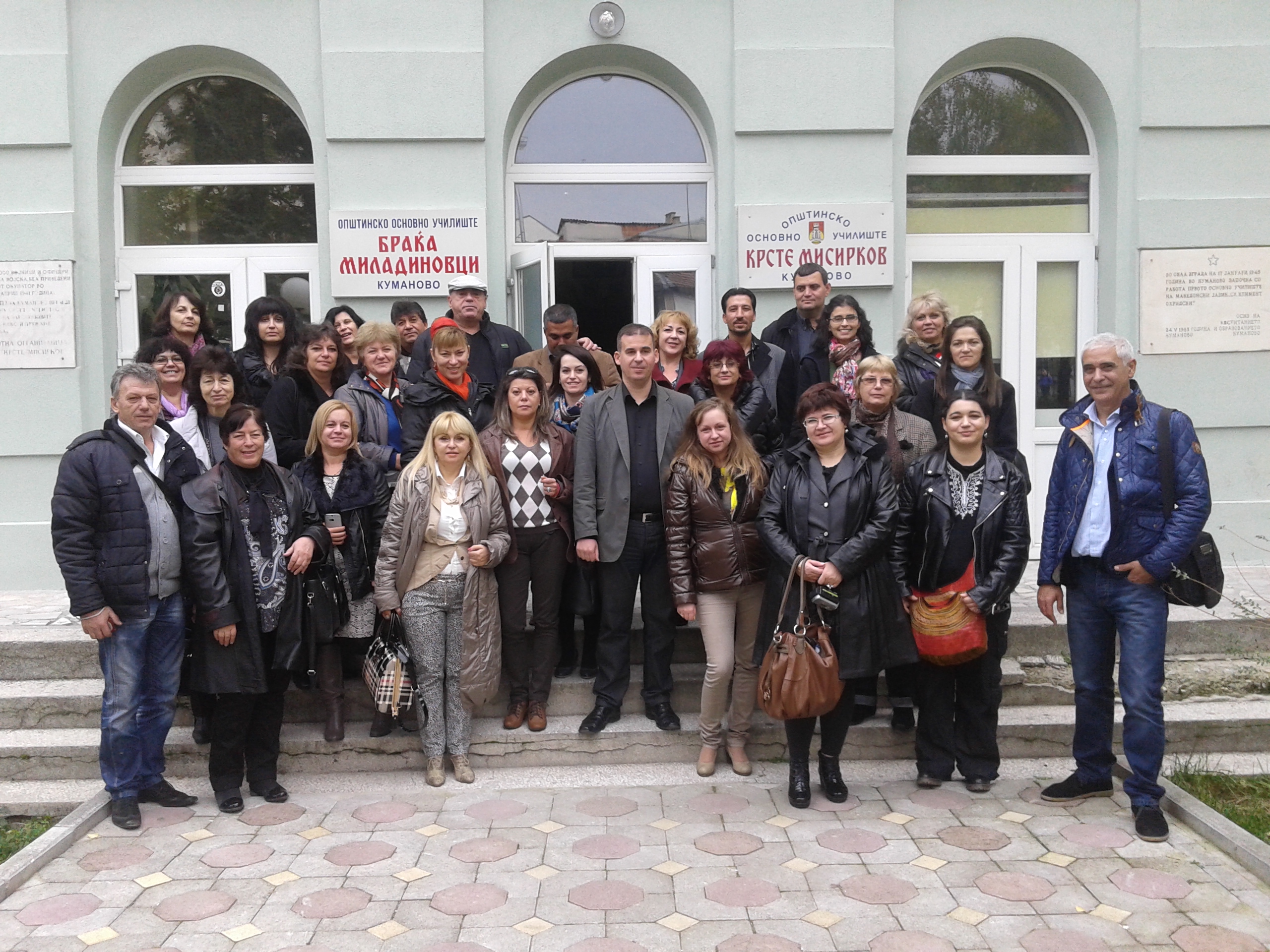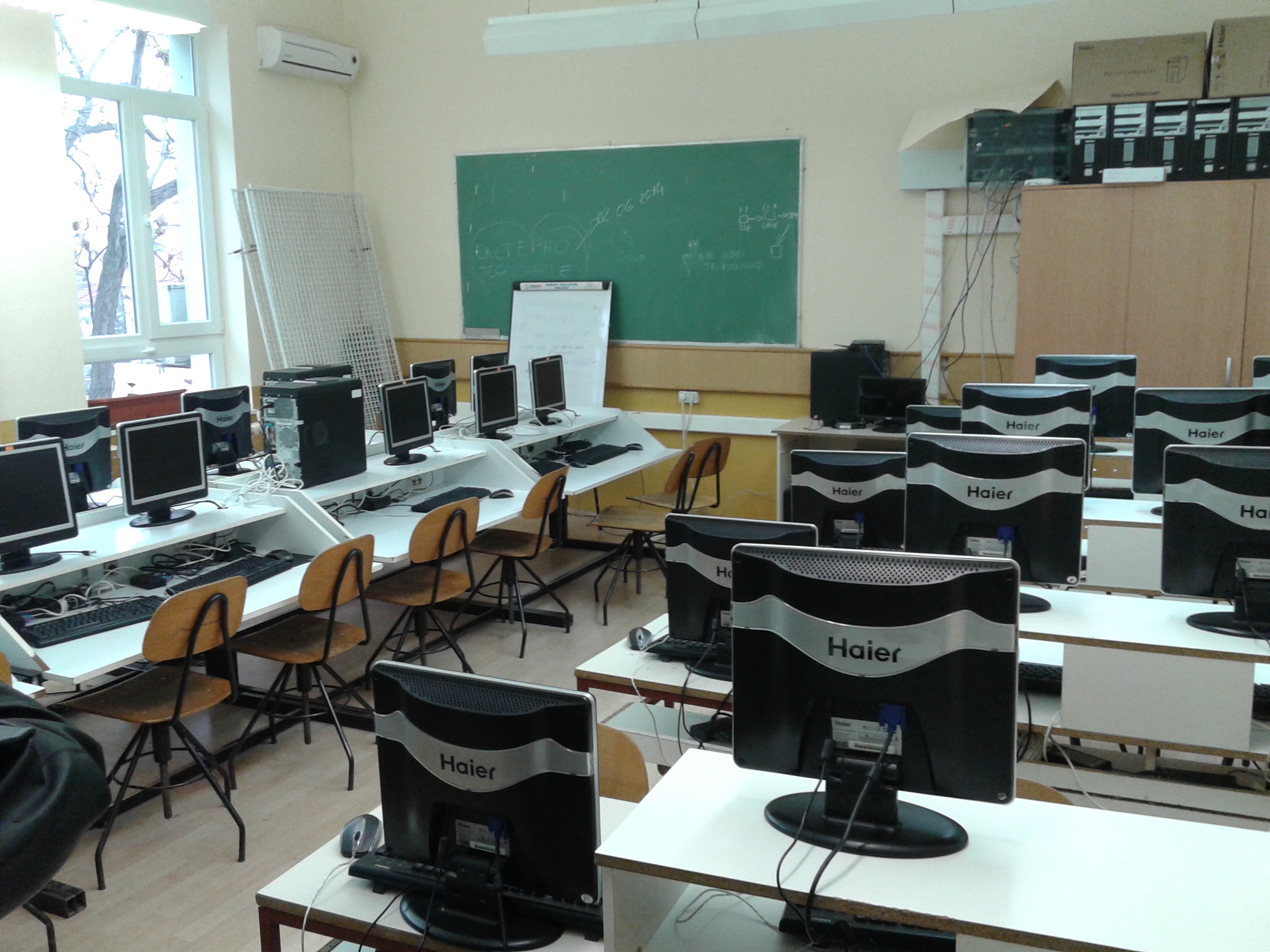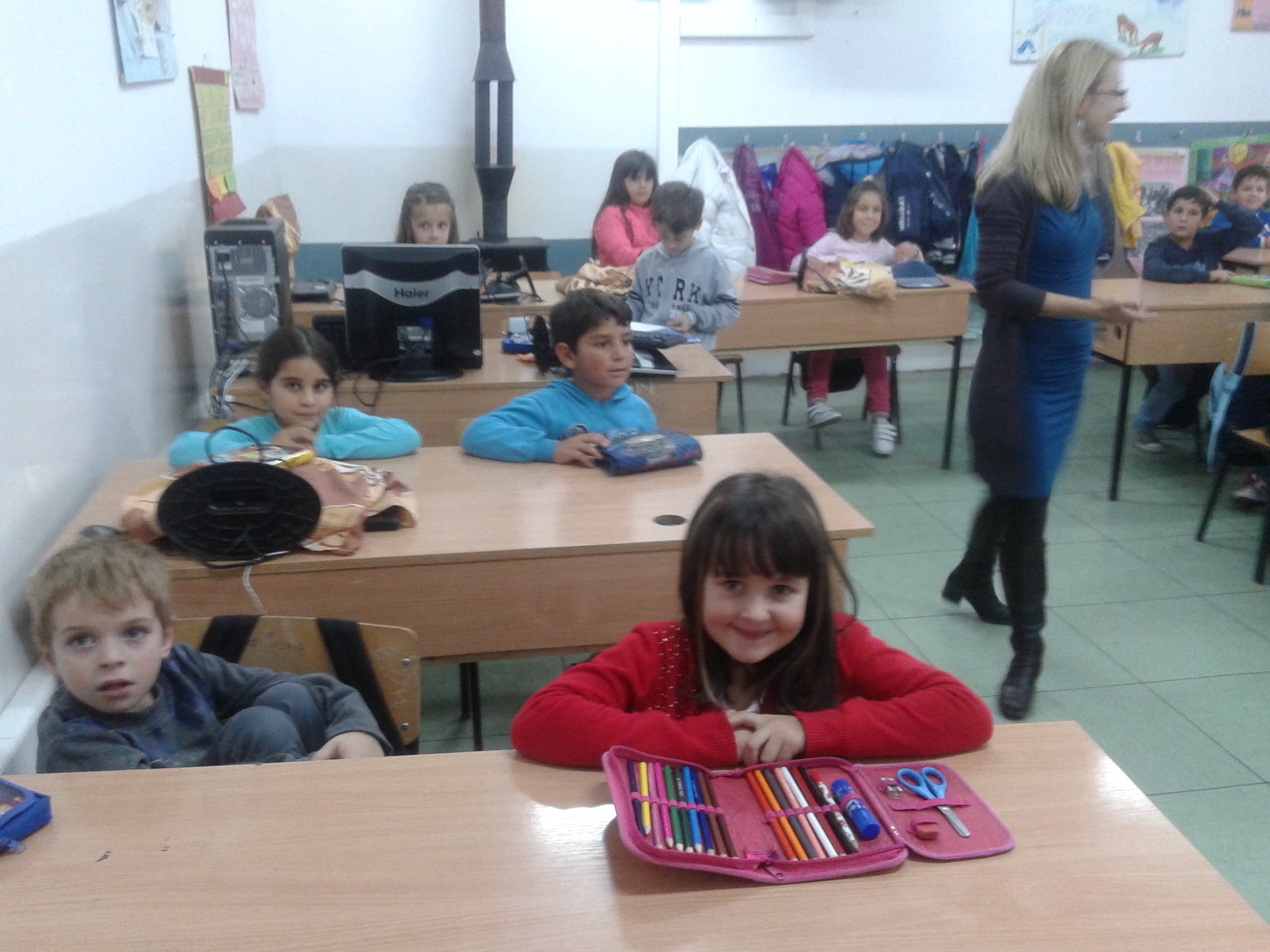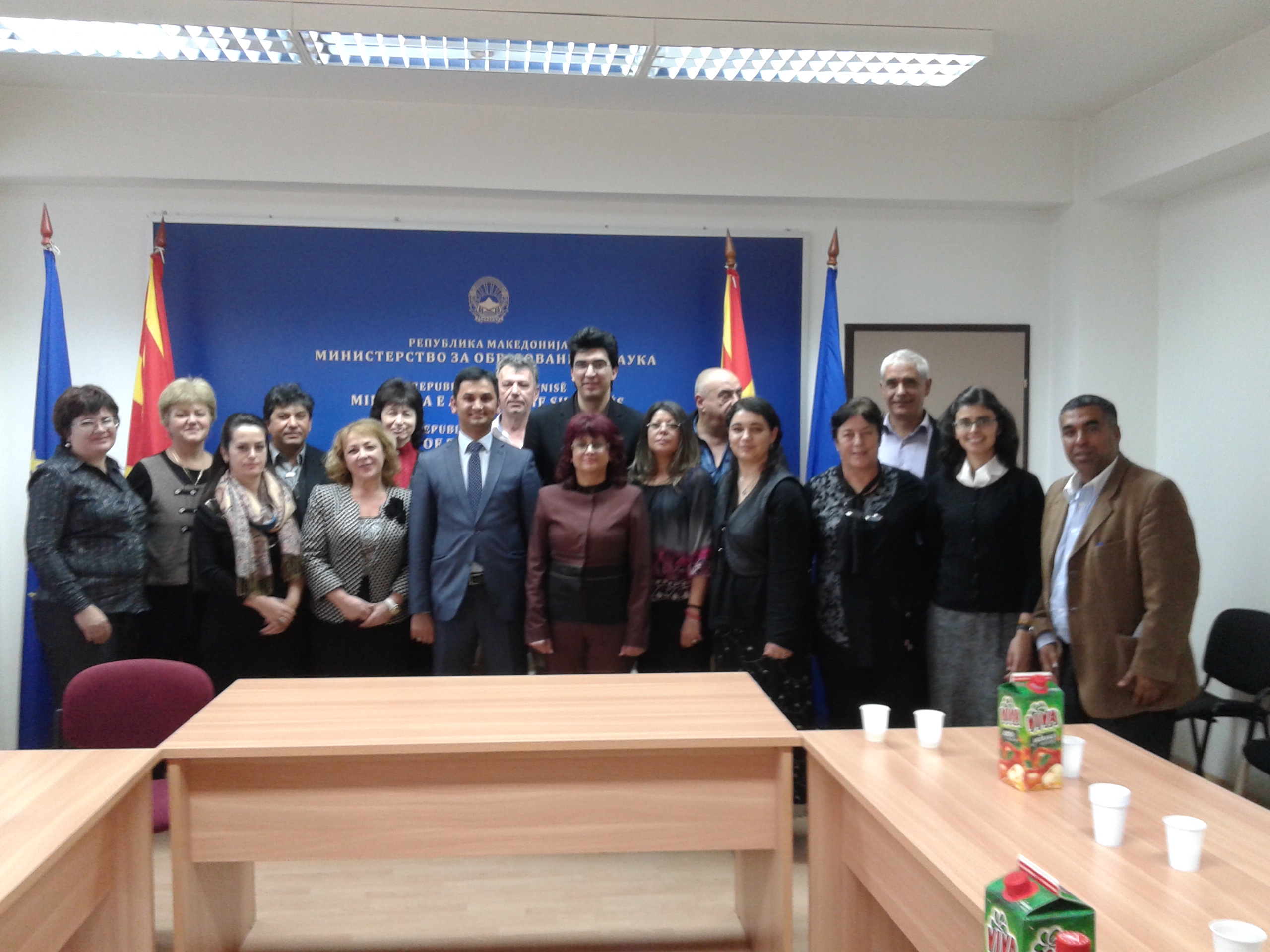11.11.2014EXCHANGE VISIT IN MACEDONIA – GOOD PRACTICES AND NEW IDEAS
 During the first days of November 2014 – from 5th to 8th of November, The Educational team at Center “Amalipe” conducted an exchange visit for principals of different schools involved in “Every student can be a winner” program. The official host of the meeting was National Roma Center (NRC) situated in the city Kumanovo, Macedonia. The agenda included various schools with entirely Roma students and with mixed ones. The visit meant to introduce the participants to the Macedonian educational system and to exchange successful experience from preventing the drop-out of students.
During the first days of November 2014 – from 5th to 8th of November, The Educational team at Center “Amalipe” conducted an exchange visit for principals of different schools involved in “Every student can be a winner” program. The official host of the meeting was National Roma Center (NRC) situated in the city Kumanovo, Macedonia. The agenda included various schools with entirely Roma students and with mixed ones. The visit meant to introduce the participants to the Macedonian educational system and to exchange successful experience from preventing the drop-out of students.
The schools we visited pointed out different issues and the legal framework of overcoming them. The Bulgarian guest were highly interested to legal right of the school to impose a serious fine for absence of school; the method of managing the educational process like the arranging 3 shifts for one the largest schools with entirely Roma students in the municipality of Shuto Orizari in Skopje, where over 2200 students attend school.
The first discussion of the visit was at the conference room of the hotel ‘Harmony” in Kumanovo, where the group was accommodated. The main participants in it were representatives of the moto-club “The Bears”, in Kumanovo. In the struggle of the Stereotypes, we added the general image of the motorman, associated with vandalism, rude attitude and definitely not good attitude towards minorities. The representatives of the club, once again proved us, that not everything is just “black or white. Jovica Ginovski, leader of the club, explained us about the charity actions they do, about their cooperation with the local police and the different events they conduct at the schools again with charity purposes.
Their presentation was followed by a lively discussion and many ideas how these methods should be established in Bulgaria for attracting student’s attention in traffic safety and many other issues.
Following this introduction, Ashmet Elzowski, a general executive of National Roma Center, the official host of the exchange visit, presented the educational system in Macedonia and the purposes of the educational mediators in the country. Their function is rather social and aiming to establish relations between the community and the school without seizing each other’s role in their two-way communication. In Macedonia this position is already institutionalized and if it has started as an NPO initiative with the Roma Educational fund support, now it is entirely managed by the Ministry of Education.
 The visit at the “Kriste Mirisrkov” Primary school, was an example of a large, elite school from urban type – actually the largest school in Kumanovo. The principal Alexandar Sazdevski explained us the main principles of the school work, the statutory minimum for forming the classes, which is 24 students – a lot more than the minimum in Bulgaria. Mr Sazdevski also showed us the facilities of the school which also represented the innovated methods for education – interactive board the informatics cabinet, personal computers in the most of the rooms etc. The availability of PC could be seen even in the smaller towns and villages in Macedonia which turned out to be a main priority for the Macedonian Ministry of Education. The building houses two schools – “Kriste Misirkov” and “Brata Miladinovi”, both primary schools, which change shifts every 2 weeks. Another interesting fact was that even if that was the most elite school in Kumanovo, there also were students from the most vulnerable groups from Roma society in the city of Kumanovo. These and other interesting facts gave the Bulgarian visitors am initial general idea of the Educational system in Macedonia.
The visit at the “Kriste Mirisrkov” Primary school, was an example of a large, elite school from urban type – actually the largest school in Kumanovo. The principal Alexandar Sazdevski explained us the main principles of the school work, the statutory minimum for forming the classes, which is 24 students – a lot more than the minimum in Bulgaria. Mr Sazdevski also showed us the facilities of the school which also represented the innovated methods for education – interactive board the informatics cabinet, personal computers in the most of the rooms etc. The availability of PC could be seen even in the smaller towns and villages in Macedonia which turned out to be a main priority for the Macedonian Ministry of Education. The building houses two schools – “Kriste Misirkov” and “Brata Miladinovi”, both primary schools, which change shifts every 2 weeks. Another interesting fact was that even if that was the most elite school in Kumanovo, there also were students from the most vulnerable groups from Roma society in the city of Kumanovo. These and other interesting facts gave the Bulgarian visitors am initial general idea of the Educational system in Macedonia.
 Contrastive to the large elite school, the next school to visit aimed to show us the way of work in a small school in the close village of Miladinovtse - “Brata Miladinovi”. The educational system in Macedonia has chosen the best approach for sustaining the educational structures in every single location where there are children in school age. The alternative of optimization of school networks in Bulgaria, in Macedonia has established a functional system of central and supporting schools. In the small towns and villages with limited number of students, the elementary school is preserved no matter the overall count of the students, but remains attached to a central school which has the responsibility for the administrative management. After finishing their elementary education in the “supporting” school, the children continue their education in the central school, which provides regular free transport and textbooks. Contrary to the Bulgarian educational system, the Macedonian does not have an all-day form of education, neither lunch meal for the students. However, every school aims to provide psychologists to work with all children and parents at risk. The Bulgarian principals shared their experience with working the parents, an activity that is still not well worked out in Macedonia as an alternative approach towards the students.
Contrastive to the large elite school, the next school to visit aimed to show us the way of work in a small school in the close village of Miladinovtse - “Brata Miladinovi”. The educational system in Macedonia has chosen the best approach for sustaining the educational structures in every single location where there are children in school age. The alternative of optimization of school networks in Bulgaria, in Macedonia has established a functional system of central and supporting schools. In the small towns and villages with limited number of students, the elementary school is preserved no matter the overall count of the students, but remains attached to a central school which has the responsibility for the administrative management. After finishing their elementary education in the “supporting” school, the children continue their education in the central school, which provides regular free transport and textbooks. Contrary to the Bulgarian educational system, the Macedonian does not have an all-day form of education, neither lunch meal for the students. However, every school aims to provide psychologists to work with all children and parents at risk. The Bulgarian principals shared their experience with working the parents, an activity that is still not well worked out in Macedonia as an alternative approach towards the students.
The exchange visit proceeded in the capital of Macedonia – Skopje, in the Roma municipality Shuto Orizari, which is a suburb of Skopje with the statute of a separate municipality. As a part of our visit we went to the largest entirely Roma Primary school “Brata Ramiz and Hamid” with over 2200 students. Handling such count of students is achieved by establishing 3 shifts, taken by 120 teachers, only 20 of them being Roma teachers. The Roma teachers represent the role model who could stimulate students and become their example to follow. The principal Gulsefa Kurteshi explained that to be a teacher means to be a guide in every children personal growing and guiding them to success in life is what stimulates them to overcome this hard assignment of educating and managing such huge auditory.
 The Bulgarian delegation was received in a special meeting in the Ministry of Education and science by Redzep Ali Cupi, Director of Developing the Ethnics Minorities Department. He explained the educational reforms which Macedonia would make to improve mainly the efficiency of future Roma integration. He pointed out that according to him the major problems in high school and university education are solved – the students in the middle school are provided with free transport and textbooks, one third of the students in the universities get scholarships from the Ministry of Education. Nevertheless he stated that there are still many issues for resolving in the primary education.
The Bulgarian delegation was received in a special meeting in the Ministry of Education and science by Redzep Ali Cupi, Director of Developing the Ethnics Minorities Department. He explained the educational reforms which Macedonia would make to improve mainly the efficiency of future Roma integration. He pointed out that according to him the major problems in high school and university education are solved – the students in the middle school are provided with free transport and textbooks, one third of the students in the universities get scholarships from the Ministry of Education. Nevertheless he stated that there are still many issues for resolving in the primary education.
The ensuing conference in the center of Skopje brought together representatives of the visited schools for an additional discussion on the educational processes and their implementing them in Bulgaria and Macedonia. Special guest of the conference was Redzep Ali Cupi. In the discussion that followed, the representatives from both countries shared the most common problems they face in their everyday work and the way of overcoming them.
The 4-days stay in our neighbor Macedonia slipped by with numerous meetings and discussions, that fired the curiosity of the Bulgarian principals for the educational processes in the other countries and initiated the idea for a useful practice of organizing more exchange visits in the neighbor countries and later on to more distant ones, in order to enrich our way of looking at things and our methods of working by getting ideas from our foreign colleagues.
 During the first days of November 2014 – from 5th to 8th of November, The Educational team at Center “Amalipe” conducted an exchange visit for principals of different schools involved in “Every student can be a winner” program. The official host of the meeting was National Roma Center (NRC) situated in the city Kumanovo, Macedonia. The agenda included various schools with entirely Roma students and with mixed ones. The visit meant to introduce the participants to the Macedonian educational system and to exchange successful experience from preventing the drop-out of students.
During the first days of November 2014 – from 5th to 8th of November, The Educational team at Center “Amalipe” conducted an exchange visit for principals of different schools involved in “Every student can be a winner” program. The official host of the meeting was National Roma Center (NRC) situated in the city Kumanovo, Macedonia. The agenda included various schools with entirely Roma students and with mixed ones. The visit meant to introduce the participants to the Macedonian educational system and to exchange successful experience from preventing the drop-out of students.
The schools we visited pointed out different issues and the legal framework of overcoming them. The Bulgarian guest were highly interested to legal right of the school to impose a serious fine for absence of school; the method of managing the educational process like the arranging 3 shifts for one the largest schools with entirely Roma students in the municipality of Shuto Orizari in Skopje, where over 2200 students attend school.
The first discussion of the visit was at the conference room of the hotel ‘Harmony” in Kumanovo, where the group was accommodated. The main participants in it were representatives of the moto-club “The Bears”, in Kumanovo. In the struggle of the Stereotypes, we added the general image of the motorman, associated with vandalism, rude attitude and definitely not good attitude towards minorities. The representatives of the club, once again proved us, that not everything is just “black or white. Jovica Ginovski, leader of the club, explained us about the charity actions they do, about their cooperation with the local police and the different events they conduct at the schools again with charity purposes.
Their presentation was followed by a lively discussion and many ideas how these methods should be established in Bulgaria for attracting student’s attention in traffic safety and many other issues.
Following this introduction, Ashmet Elzowski, a general executive of National Roma Center, the official host of the exchange visit, presented the educational system in Macedonia and the purposes of the educational mediators in the country. Their function is rather social and aiming to establish relations between the community and the school without seizing each other’s role in their two-way communication. In Macedonia this position is already institutionalized and if it has started as an NPO initiative with the Roma Educational fund support, now it is entirely managed by the Ministry of Education.
 The visit at the “Kriste Mirisrkov” Primary school, was an example of a large, elite school from urban type – actually the largest school in Kumanovo. The principal Alexandar Sazdevski explained us the main principles of the school work, the statutory minimum for forming the classes, which is 24 students – a lot more than the minimum in Bulgaria. Mr Sazdevski also showed us the facilities of the school which also represented the innovated methods for education – interactive board the informatics cabinet, personal computers in the most of the rooms etc. The availability of PC could be seen even in the smaller towns and villages in Macedonia which turned out to be a main priority for the Macedonian Ministry of Education. The building houses two schools – “Kriste Misirkov” and “Brata Miladinovi”, both primary schools, which change shifts every 2 weeks. Another interesting fact was that even if that was the most elite school in Kumanovo, there also were students from the most vulnerable groups from Roma society in the city of Kumanovo. These and other interesting facts gave the Bulgarian visitors am initial general idea of the Educational system in Macedonia.
The visit at the “Kriste Mirisrkov” Primary school, was an example of a large, elite school from urban type – actually the largest school in Kumanovo. The principal Alexandar Sazdevski explained us the main principles of the school work, the statutory minimum for forming the classes, which is 24 students – a lot more than the minimum in Bulgaria. Mr Sazdevski also showed us the facilities of the school which also represented the innovated methods for education – interactive board the informatics cabinet, personal computers in the most of the rooms etc. The availability of PC could be seen even in the smaller towns and villages in Macedonia which turned out to be a main priority for the Macedonian Ministry of Education. The building houses two schools – “Kriste Misirkov” and “Brata Miladinovi”, both primary schools, which change shifts every 2 weeks. Another interesting fact was that even if that was the most elite school in Kumanovo, there also were students from the most vulnerable groups from Roma society in the city of Kumanovo. These and other interesting facts gave the Bulgarian visitors am initial general idea of the Educational system in Macedonia.
 Contrastive to the large elite school, the next school to visit aimed to show us the way of work in a small school in the close village of Miladinovtse - “Brata Miladinovi”. The educational system in Macedonia has chosen the best approach for sustaining the educational structures in every single location where there are children in school age. The alternative of optimization of school networks in Bulgaria, in Macedonia has established a functional system of central and supporting schools. In the small towns and villages with limited number of students, the elementary school is preserved no matter the overall count of the students, but remains attached to a central school which has the responsibility for the administrative management. After finishing their elementary education in the “supporting” school, the children continue their education in the central school, which provides regular free transport and textbooks. Contrary to the Bulgarian educational system, the Macedonian does not have an all-day form of education, neither lunch meal for the students. However, every school aims to provide psychologists to work with all children and parents at risk. The Bulgarian principals shared their experience with working the parents, an activity that is still not well worked out in Macedonia as an alternative approach towards the students.
Contrastive to the large elite school, the next school to visit aimed to show us the way of work in a small school in the close village of Miladinovtse - “Brata Miladinovi”. The educational system in Macedonia has chosen the best approach for sustaining the educational structures in every single location where there are children in school age. The alternative of optimization of school networks in Bulgaria, in Macedonia has established a functional system of central and supporting schools. In the small towns and villages with limited number of students, the elementary school is preserved no matter the overall count of the students, but remains attached to a central school which has the responsibility for the administrative management. After finishing their elementary education in the “supporting” school, the children continue their education in the central school, which provides regular free transport and textbooks. Contrary to the Bulgarian educational system, the Macedonian does not have an all-day form of education, neither lunch meal for the students. However, every school aims to provide psychologists to work with all children and parents at risk. The Bulgarian principals shared their experience with working the parents, an activity that is still not well worked out in Macedonia as an alternative approach towards the students.
The exchange visit proceeded in the capital of Macedonia – Skopje, in the Roma municipality Shuto Orizari, which is a suburb of Skopje with the statute of a separate municipality. As a part of our visit we went to the largest entirely Roma Primary school “Brata Ramiz and Hamid” with over 2200 students. Handling such count of students is achieved by establishing 3 shifts, taken by 120 teachers, only 20 of them being Roma teachers. The Roma teachers represent the role model who could stimulate students and become their example to follow. The principal Gulsefa Kurteshi explained that to be a teacher means to be a guide in every children personal growing and guiding them to success in life is what stimulates them to overcome this hard assignment of educating and managing such huge auditory.
 The Bulgarian delegation was received in a special meeting in the Ministry of Education and science by Redzep Ali Cupi, Director of Developing the Ethnics Minorities Department. He explained the educational reforms which Macedonia would make to improve mainly the efficiency of future Roma integration. He pointed out that according to him the major problems in high school and university education are solved – the students in the middle school are provided with free transport and textbooks, one third of the students in the universities get scholarships from the Ministry of Education. Nevertheless he stated that there are still many issues for resolving in the primary education.
The Bulgarian delegation was received in a special meeting in the Ministry of Education and science by Redzep Ali Cupi, Director of Developing the Ethnics Minorities Department. He explained the educational reforms which Macedonia would make to improve mainly the efficiency of future Roma integration. He pointed out that according to him the major problems in high school and university education are solved – the students in the middle school are provided with free transport and textbooks, one third of the students in the universities get scholarships from the Ministry of Education. Nevertheless he stated that there are still many issues for resolving in the primary education.
The ensuing conference in the center of Skopje brought together representatives of the visited schools for an additional discussion on the educational processes and their implementing them in Bulgaria and Macedonia. Special guest of the conference was Redzep Ali Cupi. In the discussion that followed, the representatives from both countries shared the most common problems they face in their everyday work and the way of overcoming them.
The 4-days stay in our neighbor Macedonia slipped by with numerous meetings and discussions, that fired the curiosity of the Bulgarian principals for the educational processes in the other countries and initiated the idea for a useful practice of organizing more exchange visits in the neighbor countries and later on to more distant ones, in order to enrich our way of looking at things and our methods of working by getting ideas from our foreign colleagues.








